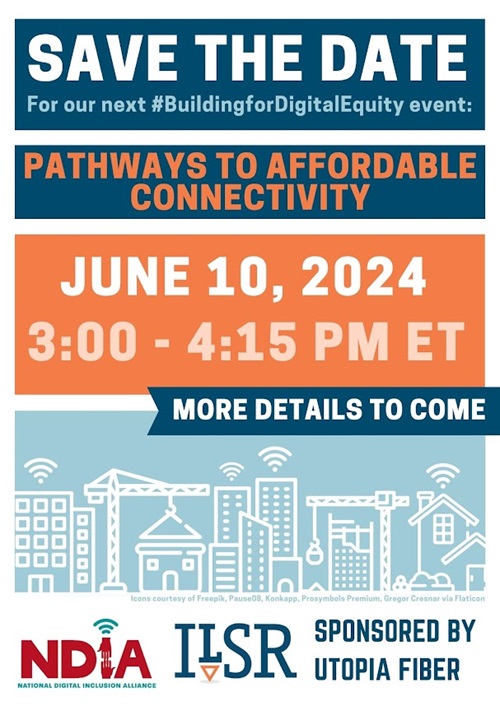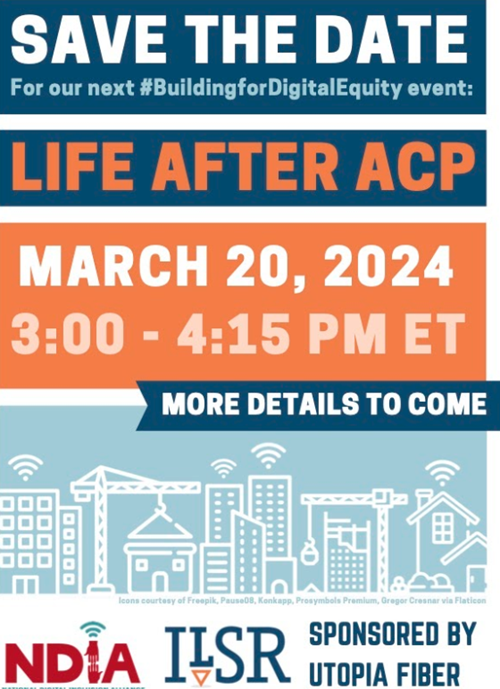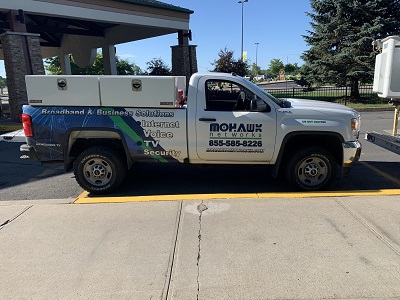
Fast, affordable Internet access for all.

With the end of the Affordable Connectivity Program (ACP) upon us, digital inclusion practitioners are encouraged to save the date for the second Building for Digital Equity (#B4DE) event of the year.
The popular (and free) virtual gathering – co-hosted by Institute for Local Self Reliance (ILSR) Community Broadband Networks Initiative and the National Digital Inclusion Alliance (NDIA) – will be held on June 10, 2024 from 3 to 4:15 PM ET.

Coming on the heels of our last B4DE event in March, the theme for this installment will be “Pathways to Affordable Connectivity.”
It will feature an informative agenda that focuses on what digital equity advocates across the nation are doing to address broadband affordability and the pressing need for creating sustainable solutions for communities.
You can register for the event here.
As with the previous #B4DE events, the June live stream will once again be sponsored by UTOPIA Fiber and co-hosted by NDIA’s Pamela Rosales and ILSR’s Community Broadband Networks Initiative Director Christopher Mitchell.
Bringing together a nationwide cross-section of leading digital inclusion practitioners, the first Building For Digital Equity (#B4DE) livestream of the year is set to zoom in on the imminent end of the Affordable Connectivity Program (ACP).
Co-hosted by the ILSR's Community Broadband Networks Initiative and the National Digital Inclusion Alliance (NDIA), the popular (and free) virtual gathering will focus on “Life After ACP” – as the FCC continues to wind down the program with the $14.2 billion fund on track to run out of money by the end of April.
Set for March 20, 2024 from 3 to 4:15 PM ET, the lineup of speakers will share on-the-ground perspectives and approaches being adopted at the community level as they work to keep financially-strapped households connected beyond ACP.
While virtual seats for #B4DE fills up fast, registration is still open here.
Here’s the run-of-show:
NDIA’s Amy Huffman will set the table on where things stand with the ACP wind down process before two lightning rounds take center screen.
As the Affordable Connectivity Program (ACP) nears its end, our first Building For Digital Equity livestream of 2024 will focus on what digital inclusion practitioners across the nation are doing to ensure that as many ACP recipients as possible do not lose access to high-speed Internet.
The free virtual gathering – #B4DE Life After ACP – will be held on March 20, 2024 from 3 to 4:15 PM ET.
Attendees are encouraged to register now here.
As the FCC is in the midst of winding down the ACP, which will run out of funds by April, it’s anybody’s guess just how many of the nearly 23 million Americans enrolled in the program will be forced to discontinue their Internet service because they can no longer afford it. But, if the 1,300 digital equity advocates who descended on Net Inclusion 2024 in Philadelphia two weeks ago is any indication, one thing is certain: the national effort to tackle the broadband affordability crisis will continue – even in the absence of ACP.
Sponsored once again by UTOPIA Fiber and co-hosted by the National Digital Inclusion Alliance (NDIA) and ILSR’s Community Broadband Networks Initiative, the line-up of frontline digital inclusion practitioners will share their outlook and strategies and help provide attendees with a road map in dealing with the imminent demise of the program.
The livestream will be available (and later archived) on Facebook, YouTube, X (formerly Twitter), and LinkedIn, with live viewer questions answered by the invited speakers and presenters. We recommend viewing it on YouTube where the live chat will be most engaging. Other questions can be submitted using the #B4DE hashtag on X.
With the nation's premier digital inclusion conference in full swing right now in Philadelphia – and with yet another banner year in broadband in the making – the first Building For Digital Equity (B4DE) livestream event of the year is now set for March 20.
As you read this, the National Digital Inclusion Alliance (NDIA), organizers of Net Inclusion 2024, are engaging with hundreds of digital inclusion practitioners, advocates, academics, Internet service providers, and policymakers from across the nation at the conference. Joining them there in the City of Brotherly Love is a full complement of the Institute for Local Self Reliance (ILSR) Community Broadband Networks team. The energy and ideas from the event will inform the upcoming B4DE that will feature the theme: Life After ACP.

We encourage you to save the date and register here for the popular (and free) virtual gathering to be held March 20, 2024 from 3 to 4:15 PM ET.
Coming on the heels of our last B4DE event in December, digital inclusion advocates are strategizing around how to tackle the broadband affordability challenge as the FCC winds down the Affordable Connectivity Program (ACP).
Capping off a banner year in broadband, ILSR and NDIA’s final Building for Digital Equity livestream of 2023 this week had its largest audience to date since the online quarterly series started in 2022.
Digital Equity Unwrapped: End of Year Reflections/The New Year Ahead, sponsored by UTOPIA Fiber, featured timely topics and practical insights from an array of frontline digital inclusion practitioners, teeing up Net Inclusion 2024 – the biggest in-person gathering of digital equity advocates in the nation.
That event will be hosted by the National Digital Inclusion Alliance (NDIA) in Philadelphia, February 13-15, 2024.
If you missed the #B4DE 2023 finale or would like to see it again, you can watch it in its entirety below.
It includes lightning round presentations from the Administrator for Chicanos Por La Causa (CPLC) Nubia Estrada and OCA Asian Pacific American Advocates Policy & Organizing Manager Eric Kim; a preview of this year’s Trailblazer Awards with a special guest appearance by Rebecca Kauma, LA County’s Director of Digital Equity; and an update on the work being done by Shaping Our Appalachian Region (SOAR) Digital Navigator Ashley Smith.
Putting a bow on the holiday season event was keynote speaker Patrick Messac, Director of the Bay Area-based digital equity nonprofit #OaklandUndivided. Messac connected the dots on the importance of equitable infrastructure investments, mapping, and ways local communities might leverage the FCC’s new rules to address digital discrimination.
Digital Equity Unwrapped: End of Year Reflections/The New Year Ahead is just a week away, as seats are filling up fast for next Tuesday’s Building for Digital Equity (#B4DE) event.
The popular (and free) virtual gathering – slated for December 12, 2023 from 3 to 4:15 pm ET – will highlight important milestones in broadband over the past year and take a look ahead for what promises to be another busy year for digital inclusion practitioners across the country.
There’s still time to register for the event here.
Co-hosted by the Institute for Local Self Reliance (ILSR) Community Broadband Networks Initiative and the National Digital Inclusion Alliance (NDIA), the final #B4DE of the year will serve up practical insights on everything from Digital Equity Act planning to how communities are confronting digital discrimination.

The event will be sparked by lightning round presentations featuring Affordable Connectivity Program (ACP) Administrator for Chicanos Por La Causa (CPLC) Nubia Estrada and OCA Asian Pacific American Advocates Policy & Organizing Manager Eric Kim. Each will give a concise overview of their outreach work with “covered populations.”
As state and local broadband leaders engage “covered populations,” as defined under the Digital Equity Act, AARP and ILSR’s Community Broadband Networks Initiative has been working in partnership over the past two years to deliver “Broadband for Beginners” workshops in states across the country that target individuals 60 years of age or older – and those who work with them.
Next month, on Dec 7 from 8:30 AM to 5 pm ET, AARP Maine and the ILSR team will wrap up the year with an in-person workshop in Bangor, Maine. The all-day event is designed to demystify broadband technology and help empower older adults to join the effort to expand digital equity, most especially those who have been reluctant or fearful to explore the opportunities broadband access offers.

There is still time to register here.
The agenda will serve up a veritable buffet of broadband topics and leave participants stuffed with confidence in how to advocate for their needs in an increasingly digital society.
“We are thrilled to be working with AARP in Maine,” said ILSR Community Broadband Networks Director Christopher Mitchell. “The state of Maine is making great strides on Internet access and we look forward to supporting that work with many of the people responsible for it.”
Inline image of older adult typing on laptop courtesy of StockVault, CC0 1.0 Universal
With the holiday season upon us, the Institute for Local Self Reliance (ILSR) Community Broadband Networks Initiative and the National Digital Inclusion Alliance (NDIA) are gearing up for the final Building for Digital Equity (#B4DE) event of the year and encouraging digital equity practitioners to save the date.
The popular (and free) virtual gathering will be held December 12, 2023 from 3 to 4:15 pm ET and will feature a holiday-inspired theme: Digital Equity Unwrapped: End of Year Reflections/The New Year Ahead.
You can register for the event now here.
Coming on the heels of our last B4DE event in October, which is still reverberating through digital inclusion circles across the nation, we are excited to follow up with a jolly and informative agenda that will cover:
The keynote speaker for the event will be Patrick Messac, Director of #OaklandUndivided, an equity-based, collective impact initiative launched in Oakland, California.
As a young woman of the Nuxalk Nation, Mallory Hans is “clearing a path for future generations.”
A 2022 graduate of the British Columbia Institute of Technology, she’s one of about 50 people hailing from various Tribes and First Nations across North America in attendance for the latest Tribal Broadband Bootcamp, a three-day intensive learning experience focused on building and running Tribal Internet networks.
Held in different tribal regions several times a year since the initiative began in 2021, this bootcamp (the eighth in an ongoing series of hands-on seminars) is being hosted at the Akwesasne Mohawk Casino Resort on the Saint Regis Mohawk reservation along the New York/Canada border.
“So far so good,” Mallory said on Day Two of the bootcamp just as the attendees broke into small groups to go through a variety of demonstration stations set up by bootcamp instructors and Tribal employees who run Mohawk Networks, which provides fiber-to-the-home (FTTH) Internet, video, and voice services across the reservation in northern New York.

In continuing the driving impulse to demystify technologies and build capacity among cohorts in Tribal nations, Day Two was centered around fiber stations that included demonstrations of how network operation centers are run; one on fiber splicing; another showcasing equipment used to install fiber inside of households with representatives from Calix, and another station on the electronic equipment that measures the performance of fiber lines.
“I’m enjoying it, feeling more confident and finding out I’m capable,” said the 22 year-old, newly minted fiber technician.
The Community Broadband Networks (CBN) team here at the Institute for Local Self-Reliance (ILSR) is thrilled to announce we will once again welcome a postdoctoral fellow this coming fall to undertake a two-year project that advances policy initiatives in support of expanding broadband access and digital sovereignty for Tribal Nations across the U.S.
It’s the second time the American Council of Learned Societies (ACLS) has selected ILSR as a host organization for a Leading Edge Fellowship, which embeds humanities and social science PhDs with nonprofits committed “to solve problems, build capacity, and advance justice and equity in society.”
Earlier this month, ACLS announced 18 new ACLS Leading Edge Fellows for 2023. In September, one of those fellows – Jessica E. Auer (PhD, History, University of North Carolina at Chapel Hill) – will join the CBN team, kicking off her full-time fellowship as a Tribal Broadband Policy Analyst.

Jessica will conduct original research and writing to help develop policy narratives that can be used to support new and existing tribal broadband efforts.
With less than 60 percent of those living on Tribal lands in the lower 48 states having access to basic broadband connections – as Native Nations have regularly been excluded from policy conversations around these issues – Tribal citizens miss out on educational, economic, telehealth, social networking, and a panoply of other activities that foster community resiliency and democratic engagement in the modern world.